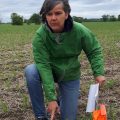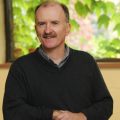
Get your e-ticket scanned, receive your name tag as well as your simultaneous translation headset, if applicable.

Can we reverse global warming while feeding the planet? Can we restore billions of hectares of depleted grasslands? Can we replenish and purify water tables? Can we leave our planet for our children far better than we inherited it? The answers are: Yes! And the key to all of that is through regenerating soil health. This first evening will be an overview of the multiple solutions brought by living soils.
MC: Larry Kopald, President and Co-Founder, The Carbon Underground








Get your e-ticket scanned, receive your name tag as well as your simultaneous translation headset, if applicable.

A brief overview of the four pillar ecosystem services and functions of healthy soils.
MC: Graham Calder, Chief Designer, P3 Permaculture


Presentation of practical applications of living soil sciences for food production as well as the resulting benefits, such as increased productivity, replacement of chemical inputs, as well as pest and disease suppression. Overview of different agricultural techniques to promote living soils as well as innovative case studies.
MC: Graham Calder, Chief Designer, P3 Permaculture






Restoring soils and restoring the water cycle go hand in hand. Learn how promoting living soils also helps lowering irrigation needs, increasing water retention, enhancing resistance to drought and flood, and replenishing and purifying freshwater reserves.
MC: Seth Itzkan, Co-founder of Soil4Climate




Brief section on the relationship between soil health and human health, including the increased nutrient density of foods grown in healthy soils and the relationship between soil health and the human microbiome.
MC: Liza Charbel, Permaculture and Community Development, Gardens without borders



How can we integrate living soils techniques into the reality of large scale field crop producers?
Introduction by: Simon Bégin, Spokesperson, Institut Jean Garon






Get your e-ticket scanned, receive your name tag as well as your simultaneous translation headset, if applicable.

Soils are the largest terrestrial carbon sink on earth; however, most agricultural soils have lost 50 to 70% of their original soil organic carbon stocks, which has been a major contributor to man-made climate change. Regenerative land management techniques can reverse this cycle and help sequester billions of tons of carbon annually in soils worldwide, effectively reversing human caused amplification of climate change. Living soils also have the capacity to remove other man-made greenhouse gases from the atmosphere. This section will discuss these processes and will highlight certain techniques that particularly enhance soil carbon stocks. The carbon market as well as the role of businesses in regenerating soils will also be addressed.
MC: Antoine Rauzy, Science and Higher Education Attaché, French Embassy in Canada









Businesses play an important role in driving forces that impact our environment. In this panel, we will showcase different business models that encourage the regeneration of soil health.
Introduction by: Cameron Stiff, Director of Finance and Development, Compost Montreal








Here, participants will have the opportunity to submit themes for discussion groups they would like to lead and to vote for themes they would like to discuss. The audience will separate into six different rooms according to which topic they would like to address.

Closing speeches and notes on the future avenues to explore in order to promote living soils.





































